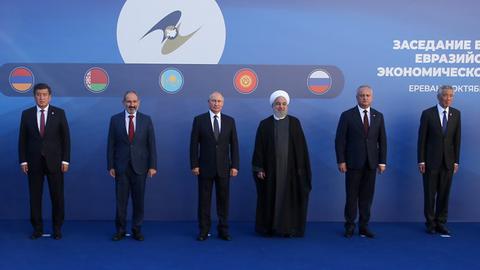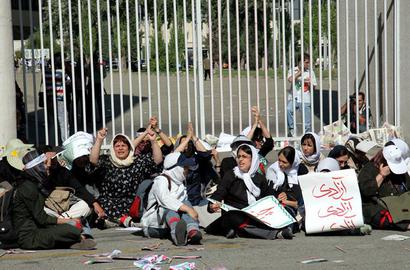In their latest attempt to cope with the heavy impact of United States-imposed sanctions, Iran’s leaders are hopeful that the country will enjoy some much-needed economic respite as it joins the Eurasian Economic Union, a trade pact that brings together countries from north Asia and Eastern Europe, and which includes Russia, Belarus, Armenia, Kazakhstan, and Kyrgyzstan. At the moment, the five countries enjoy a temporary free trade zone using their own currencies. From October 27, Iran will join the union under a “preferential commodity trade” arrangement.
Iran’s foreign minister Mohammad Javad Zarif has described President Rouhani’s recent participation at the Eurasian Union summit in Armenia at the beginning of October as “important progress” for Iran’s economy. "With parallel work on North-South & South-West Transit Corridors, ground paved for expansion in regional trade & cementing of our role as vital transit hub,” Zarif tweeted.
Tehran signed an agreement with the five countries that will allow Iran to export 360 out of 862 goods the union countries trade between them; in turn, those countries will export 502 goods to Iran. The preferential trading commodities mean that Iran will enjoy a range of trading incentives including lower customs tariffs; in some cases, the tariffs will actually be eliminated.
According to Iran’s Chamber of Commerce, Industry, Mine and Agriculture (ICCIMA), this could be a significant opportunity for Iran to combat the impact of US economic sanctions, particularly due to the diversity of resources and markets within the member countries of the Eurasian trade union.
The main commodities Iran will export will be seatrout, shrimp, ornamental flowers, fresh fruit, pistachios, dates, cookies and traditional sweets, juice, salt, caulk, paraffin, antibiotics, soap, detergents, rubber, cars, different types of industrial and handmade rugs and floor coverings, tiles, ceramics, kitchenware, stone, silver, precious metal in both raw and processed forms, iron, profile and cast iron pipes, copper wiring, electrical water heaters, and engine parts for large trucks used to transport goods.
The Eurasian Union, which is essentially led by Russia, will export 500 various goods and commodities under special customs tariffs and trade deals. Exported goods will include beef, lamb, fish, butter, honey, vegetables, tea, barley, corn, rice, mineral water, pharmaceuticals, health and beauty products, wood, paper, gold and silver jewelry, gas piston engines, excavators, bulldozers, trailers, helicopter engine parts, motorcycles, cameras, seismic devices, generators, and consumption meter devices for electricity and gas.
The agreement states that the Eurasian Union countries will have reduced or waived trade and customs tariffs for three years. At the end of the three-year period, the union will assess the arrangement and determine whether it will continue, and for which goods.
No Nuclear Goods
Crucially, the agreement stipulates that nuclear and fissile materials, or any materials that can be used to produce nuclear fusion will not be covered, nor will any good that can be used in nuclear programs, military facilities, or military offensive operations.
US sanctions have forced Iran to take advantage of its regional opportunities and forge cooperative trade arrangements with its neighboring countries. Russia will welcome the opportunity to gain even more power in the region, and use Tehran’s dependency on it to spread its influence from middle Asia into the Middle East — a power relationship it has enjoyed in the past, particularly under previous sanctions regimes.
Russia is itself economically and diplomatically isolated to a degree because of European Union sanctions, and has a problematic relationship with the United States, as Iran does. It was among the six countries to reach the nuclear deal (the Joint Comprehensive Plan of Action) with Iran, but it also has sanctions in place against Iran, as the United States does. Luan Jagarian, Russia’s ambassador to Tehran, has acknowledged that US sanctions have had a negative influence on Iran and Russia’s nuclear cooperation, but it seems likely that diplomatic relations between the two countries will change if Iran’s diplomatic ties with Europe and the US improve.
However, the Eurasian trade pact countries are economically unstable and so not necessarily strong enough to compensate for the impact of US sanctions against Iran. But Iran will have to hope a degree of compensation will derive from the deal. As the countries will use their own currencies, any trade deals will exclude the US dollar. The diversity of the import commodities that will come into Iran compared to its exports means that the national currencies of the countries — especially Russia’s — will be strengthened, but Iran will not profit to the same extent as the other countries, chiefly because its export goods are less diverse and more limited.
But in the current dire economic climate, it is vital that Iran tries to do something to bolster its economy. And turning to Russia for help seems to be one of its only options.
visit the accountability section
In this section of Iran Wire, you can contact the officials and launch your campaign for various problems

























comments